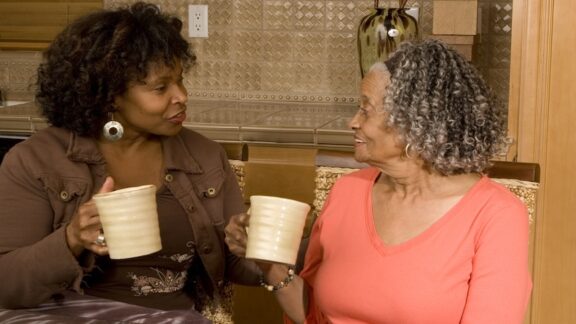By Margit Novack
In “Still Someone,” from Squint: Re-visioning the Second Half of Life, author and professional senior move manager Margit Novack shares personal anecdotes that illustrate important considerations in communicating with the older adults in our lives, communicating in a way that respects their dignity and limitations.
A client was taking me on a tour of her apartment.
“See this picture, this is me and my daughter Joan in our first house. I loved that house,” she told me.
“No, Mom, that’s me,” her daughter Eileen corrected.
Realizing her mistake, her mother stopped and became quiet.
“Why did you have to correct her?” I thought to myself. “She was telling a story. Did you see her face when you pointed out that she made a mistake?”
I’ve seen this happen 100 times – adult children correcting their parents, unable to allow an inaccurate memory even at the cost of hurting their parents’ feelings. I think it’s instinct, more than conscious decision, because if they thought about it, they would choose to be kind.
“Margie, dear, I’m moving, and I need your help.” So began the call from my then ninety-one-year-old aunt, Betty. Never mind that I’d been Margit for thirty-eight years. To Aunt Betty, I would always be Margie. I went to Florida to help her move from a two-bedroom apartment into a senior living community.
Betty moved to the community on a Monday, taking only two suitcases. The community provided furniture on loan until hers could be delivered. My job was to help her go through belongings at the old apartment, identify what she wanted, and have it brought to the community – in short, to help her sort through her possessions and downsize. No problem. After all, I figured, I’m a Senior Move Manager. But I was also, I discovered, a niece, and throughout the weekend these two roles collided.
Like many of my clients, Aunt Betty had a hard time parting with items I knew she would never use. Sometimes, I could cajole her into letting something go.
“But I loved this lamp,” she said, pointing to a forty-inch-high lamp that was still in its shipping box from eight years earlier.
“Well, not enough to use it in the past eight years,” I replied.
“You’re right,” she said with a laugh.
These interactions—I refer to them as reality checks—were easy because they did not diminish her as a person.
It was harder when we looked at large serving dishes.
“I may have a dinner party,” she said.
Betty was frail. She used a walker and qualified for independent living only because she had aides six days per week. I couldn’t say to her, “Betty, you will never have another dinner party. You haven’t made a meal for yourself in months.” She did not need to be reminded of this reality.
It was similar when we went through clothing she insisted she might wear someday, like a pantsuit from a dozen years earlier. I couldn’t remind her that she now wore pants with elastic waists so she could pull them up herself and with seats full enough to accommodate disposable underwear. Some images of ourselves need to be preserved as who we once were, not who we are today.
Even though much of what she wanted to take would never be worn or used, I knew there was space for it in the new apartment, so I put it in the pile to go with her. Her decisions weren’t always practical or wise, but they were her decisions, and the Senior Move Manager in me accepted that.
Later that day I met with a Move Manager colleague whose staff would handle the packing and transport of clothing and other items after I left. I took my colleague aside and said, “If you find any clothing that’s torn or stained, toss it.” As the words left my mouth, I was horrified. I would never say that about a client’s belongings! At that moment, I realized I was no longer a Senior Move Manager: I was a family member.
Some images of
ourselves need to be
preserved as who we
once were, not who
we are today.
The ease with which I lost professional objectivity and slid into judgment and expediency was alarming. I understand now why adult children are so often pulled in this direction. They’re coping with mixed feelings about their evolving role and added responsibilities as well as with changes they see in their aging family members. When expediency wins, it’s not from lack of caring – it’s from lack of energy and time.

As it turned out, the next day was when the roles of Senior Move Manager and family member were most in conflict. I had arrived Saturday morning, and Betty and I worked through the weekend. When I took her back to her new apartment, it was 8 p.m. Sunday. I dropped her at the door and suggested that she start walking toward her second-floor apartment while I unloaded my car. When I knocked on the apartment door fifteen minutes later, there was no answer. I began walking through the hallways and found Betty on the first floor.
“I got lost. I couldn’t find my apartment,” she said. “Then I got so tired, I had to sit down.”
“Your apartment number is on your walker and also on the keys around your neck,” I gently reminded her.
“I know, but I just couldn’t figure it out,” she said.
That’s when I realized I had done it again. Like so many family members, I came in for a weekend determined to get things done in the time frame I had available. I had put my need for productivity ahead of Betty’s need to rest and enjoy my visit. I wanted to be finished; Betty wanted us to have time to talk.
Betty had moved in on the previous Monday, a transition that was hard and emotional. She barely had had time to adjust when I had swooped in the following weekend and created two incredibly long and intense days. As a Senior Move Manager, I knew that stress and anxiety take an enormous toll on seniors, a toll that often manifests itself as memory loss and disorganized thinking. Whatever cognitive status Betty had before the move, the disorientation I observed Sunday night was Betty under the worst conditions. I had caused it, and I should have known better.
When I visited Betty Monday morning, I apologized for exhausting her over the weekend.
“Oh honey, I just feel so bad that you worked so hard,” she said.
There she was, the Betty I knew, parenting me, rewarding me for coming down to help. Yet, in her next sentence, she was confused about whether she was in Florida or Philadelphia. The juxtaposition of the old Betty I had seen a few seconds earlier and the new, con¬fused Betty was sobering.
In the days that followed, Betty did rebound from the stress and fatigue and began to sound more like her¬self. Still, she was aware she was changing. “My memory has gotten so bad,” she said, clearly disturbed. “I am not the person I used to be.”
To dispute what she knew to be true would be con¬descending. Yet I wanted her to know that even if her cognitive status was changing, to me, she was still the same person, and I still loved her.
“I have noticed a change from months ago,” I responded. “I think you are about 90 percent of the Aunt Betty I know, and that’s okay with me.”
Betty smiled. I think being 90 percent of Aunt Betty was okay with her, too.
Click here to read the Seniors Guide review of Squint. Or for more wisdom like “Still Someone,” on being kind to the seniors in our lives, order your copy of Squint: Re-visioning the Second Half of Life by Margit Novack.




